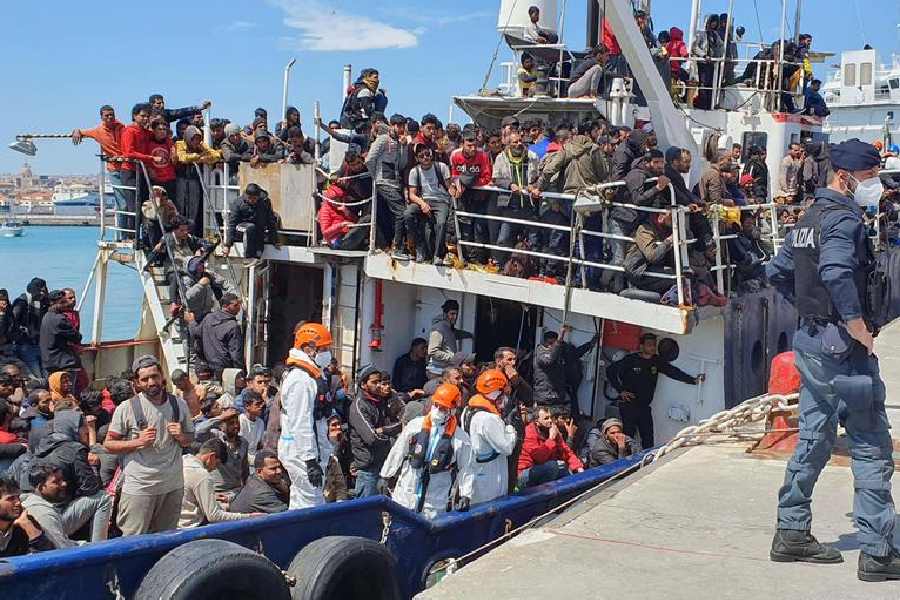A majority of Germans think immigration brings more disadvantages than advantages, according to a new survey. Half of those polled said they'd like Germany to take in fewer refugees than it currently does.
German Interior Minister Nancy Faeser, a Social Democrat, is calling for a change in the EU's migration policy to limit refugee numbers. She wants to see the identification, registration, and screening of people already at the EU's external borders.
These new plans could go down well with the electorate: A representative nationwide poll has found that half of Germans want the country to take in fewer refugees. The pollster Infratest-Dimap surveyed 1,360 eligible voters at the beginning of May and found that 54% believe the disadvantages of immigration outweigh the advantages for Germany, while only 33% say the benefits cancel out the disadvantages.
Senior voters are significantly more likely to express reservations about immigration than younger voters, and voters in eastern Germany, the former communist GDR, are more likely to do so than former West Germans.
Unsurprisingly, the opposition to immigration is greatest among supporters of the far-right populist Alternative for Germany (AfD), the strongest party in some eastern German regions.
Although most respondents were wary of immigration in general, they do make distinctions between immigrants: Four in ten want Germany to recruit more skilled workers from abroad, and only a quarter would like to see a reduction in immigration into the labor market.
But respondents were less accepting of refugees: 52% would like Germany to take in fewer of them, a marked increase of 12% compared to September 2021, when Deutschlandtrend last did a survey on the issue.
Now, 50% of respondents said they are frightened of refugees coming to Germany. This echoes similar concerns from 2016, when the arrival of hundreds of thousands of refugees mainly from Syria triggered a xenophobic backlash and gave rise to the AfD as a major political force.
Nevertheless, an overwhelming majority of Germans still believe in helping people in need: 84% say it is right for Germany to take in refugees fleeing war or civil war, and 70% support taking in those fleeing from famine or natural disasters. Although these figures are high, support was around 10% higher in February 2016.
Meanwhile, 68% now support taking in refugees who are persecuted for political or religious reasons. But 61% of respondents reject taking in economic migrants.
Over one million Ukrainians fled to Germany last year after the war began, coinciding with the arrival of around 244,000 asylum seekers — mainly from Syria, Afghanistan, and Turkey. And the number of asylum seekers continues to rise: The Federal Office for Migration and Refugees (BAMF) received more than 80,000 asylum applications in the first three months of 2023 alone.
Cities and municipalities in Germany are finding it more and more difficult to provide for these people. There is a shortage of housing everywhere, and more and more communities have to set up trailers or tents to accommodate new arrivals. Chancellor Olaf Scholz is planning a summit next week
to discuss the problem with the heads of the 16 federal states and with mayors from across the country.
Some 37% of Germans say politicians are already doing enough to care for and accommodate refugees, while 29% even say assistance goes too far. Another 27% feel Germany needs to do more for the refugees it has already taken in.
Despite their reservations about taking in more refugees, a clear majority of 60% said they support the sea rescue operations conducted by NGOs in the Mediterranean Sea, and 60% want EU governments to do more to rescue refugees and bring them to European ports.
The number of voters who feel the government is coping well with the problems associated with immigration has fallen: 35% say none of the parties are able to deal with the issue. That's a rise of 19 percentage points compared to September 2021, the time of the previous general election, which brought the current center-left coalition of Social Democrats (SPD), Greens, and neoliberal Free Democrats (FDP) to power.
Now, 21% of respondents think the opposition center-right Christian Democrats (CDU) and Christian Social Union (CSU) are best able to deal with immigration, while 12% think the populist AfD has the best policies.
But the ruling parties may score points by pushing through plans to shift asylum procedures to the EU's external borders. Some 79% of the survey's respondents supported Interior Minister Faeser's plans. Only 11% said they were opposed, arguing that such a move may undermine the right to asylum and de facto abolish it.
The CDU/CSU continues to benefit from the mounting overall dissatisfaction with the federal government, which only 28% say is doing a good job.
The conservative parties, which have led German governments more often than not over the past decades since the end of WW II, continue to lead in opinion polls by a wide margin. The SPD and the Greens continue to lose ground while the smallest parties, the FDP, and the post-communist Left Party hover just above the 5% threshold needed to secure representation in the federal parliament, the Bundestag. The next general election is due in the fall of 2025.










